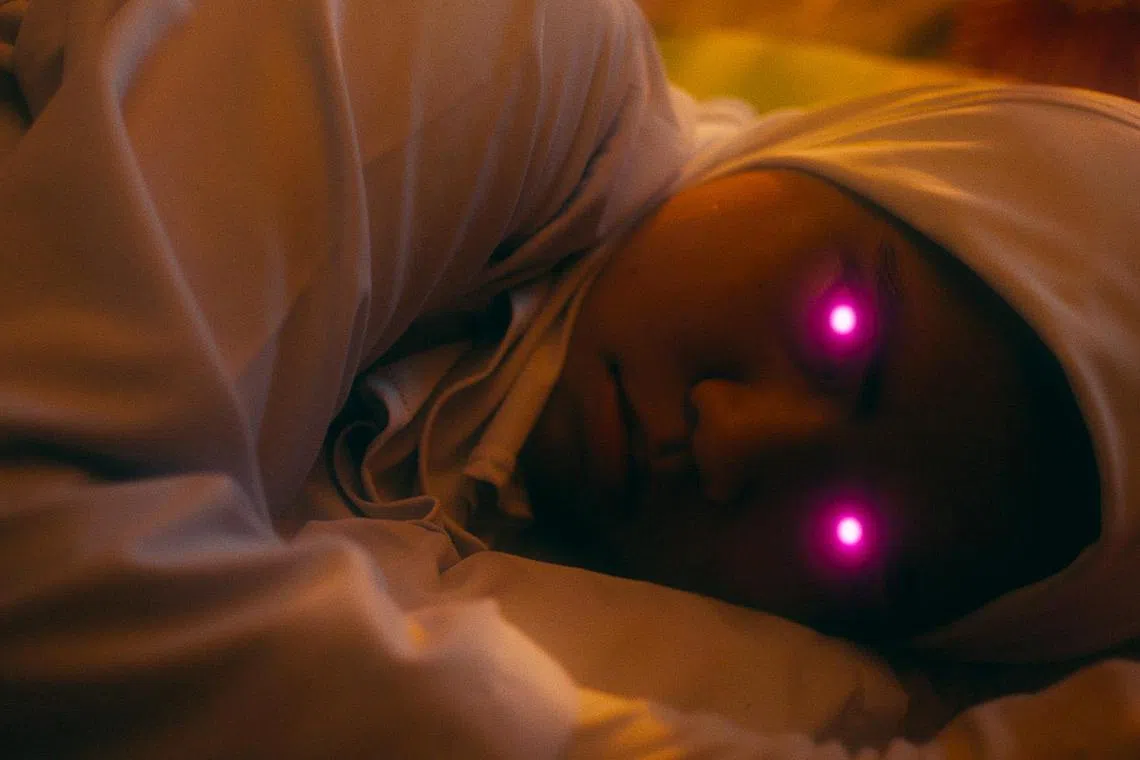Cannes-winning Malaysian horror film Tiger Stripes embraces ‘female monstrosity’
Sign up now: Get ST's newsletters delivered to your inbox

Malaysian movie Tiger Stripes is a fresh take on female empowerment.
PHOTO: NELLEU/INSTAGRAM
Follow topic:
PARIS – One day they are little bundles of joy, the next mood-swing monsters called teenagers with spots, identity crises and oceans of anger.
However, in Tiger Stripes, the first Malaysian movie to win a top prize at the Cannes Film Festival
That is a truer face of puberty, insists director Amanda Nell Eu, a passionate advocate of “feminine monstrosity”, which she uses to offer a wildly fresh take on female empowerment, starring Zafreen Zairizal as the 11-year-old protagonist.
“It is not all beautiful – she’s a monster, she’s wild, she’s violent and scary. But also she is herself, and we should celebrate that,” Eu said of the film’s hairy heroine.
The 37-year-old Malaysian wanted to challenge the silence and fear hanging over puberty she recalled growing up in Malaysia and England.
“I feel like for a lot of girls, once they hit the defining moment of puberty, they start learning about shame, about insecurity,” she said.
“I suddenly became hyper-aware of my body and I realised other people were hyper-aware of it and that made me feel really uncomfortable.”
In Tiger Stripes, which won the Critics’ Week Grand Prize at Cannes, she exposes and explodes that discomfort, following three friends at a girls’ school and the changing dynamics when one gets her period.
As she begins to perspire more, smell differently and need a bra, others look at her like she is dirty, some girls parroting social conventions by calling her a “whore”.
But then the film veers off into uncharted territory.
The girl whips off her full veil to reveal a tigerish monster, terrifying those around her, but also offering a new narrative of liberation.
“I love the ambiguity of it. She turns into a creature instead of a woman, and that just makes it more open for everyone.”

Malaysian director Amanda Nell Eu’s film, Tiger Stripes, is the first Malaysian movie to win a top prize at the Cannes Film Festival.
PHOTO: AFP
Eu’s inspiration for her first feature came from the female monsters she read about in Malaysian folklore – and also her experience at a girls’ boarding school.
She has a British grandmother and moved to England when she was 11, enrolling in a school in High Wycombe.
“It can be the most beautiful supportive place and the most horrible, lonely place at the same time,” Eu said.
She studied graphic design at Central Saint Martins in London, but discovered her true calling was cinema.
Wanting to make films but feeling out of place in Britain, she moved back to Kuala Lumpur. “I didn’t know who I was and... I couldn’t find something that I wanted to tell a story about.”
But the feeling of being an outsider followed her back to Malaysia, where she talked differently and did not share the cultural references of her peers.
But making short films unlocked her passion and a path to explore “feminine monstrosity”.
It’s Easier To Raise Cattle (2017) follows a teen vampire living in the jungle, while Vinegar Baths (2018) features an abortion nurse who feasts on dead babies.
The subjects can sound grisly, and Tiger Stripes has been hailed as a “body horror” in the mould of the cult French hit Raw by another woman director, Julia Ducournau, who triumphed at Cannes in 2021.

A still from the horror film Tiger Stripes, with actress Zafreen Zairizal (pictured) playing an 11-year-old whose puberty causes terrifying changes to occur.
PHOTO: GHOST GRRL PICTURES
But while tackling complex issues head-on, the bubbly Eu does not take herself, or her films, too seriously.
“I want people to chuckle and feel uncomfortable and weird, but also find it funny. I feel you can laugh about these serious things and emotions.”
Eu cites Mean Girls (2004), one of Hollywood’s nastiest teen flicks and arguably American actress Lindsay Lohan’s finest hour, as one of her favourite films.
In Tiger Stripes, adults are usually a source of ridicule. Shot from afar, they are slow to catch on, clueless when the drama hits.
The girls, by contrast, are filmed often in intense close-ups.
To get even deeper into their world, Eu also incorporated shots from mobile phones that the girls filmed themselves.
“It’s really important to get their gaze,” Eu said of the footage that includes the girls dancing raucously in school toilets, trying on bras, but also group bullying.
Puberty, after all, is about breaking everything, but also constructing something new, and although Eu’s heroine escapes into the jungle, that is not the end of the story.
“If you want to fight for your freedom, it’s not rainbows and blue skies for the rest of your life. You need to find your community.” AFP

